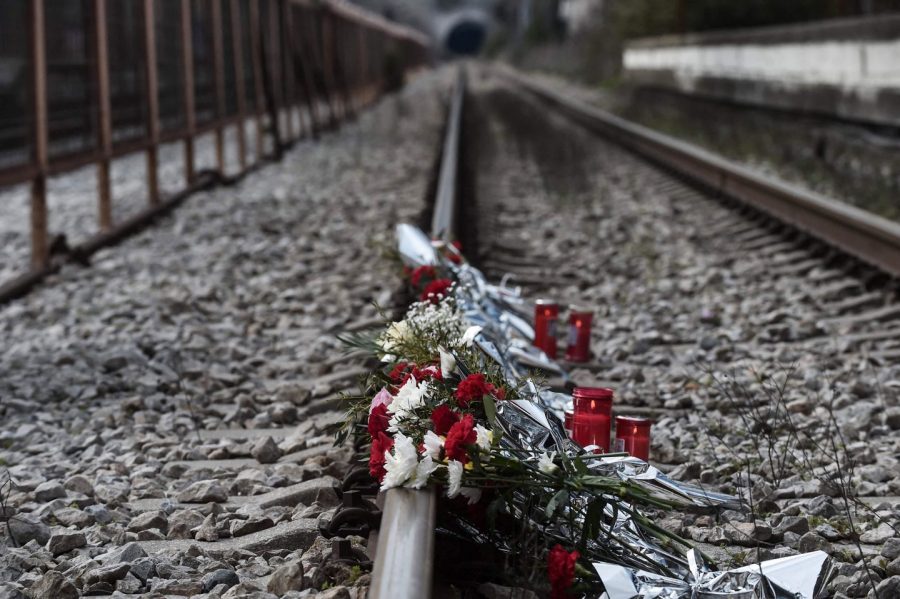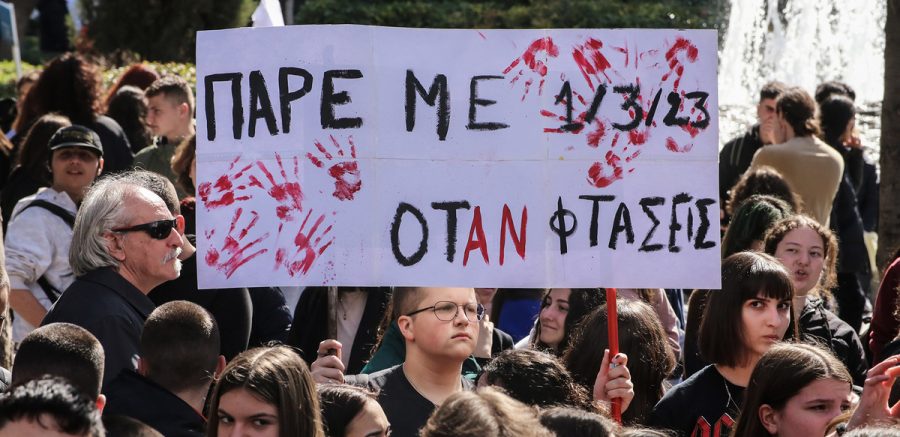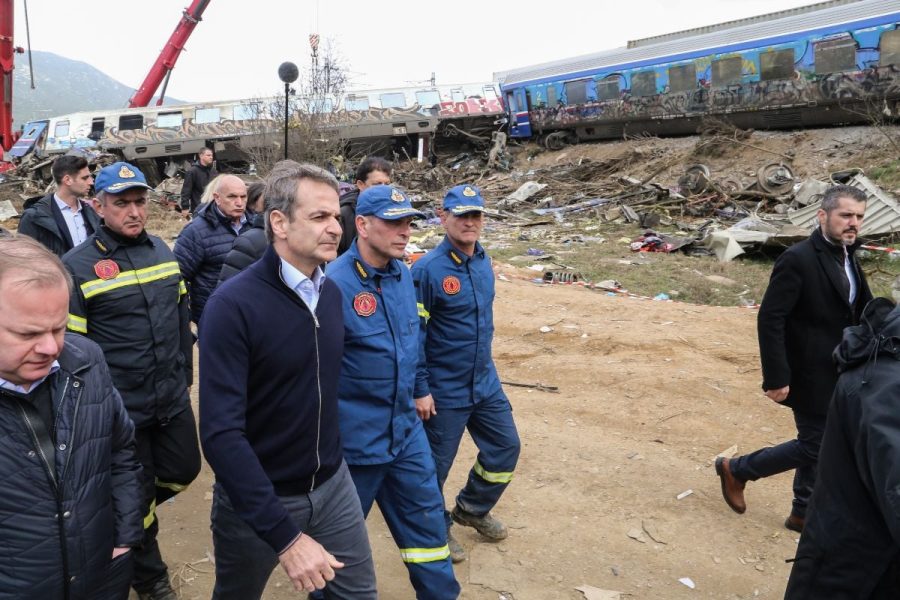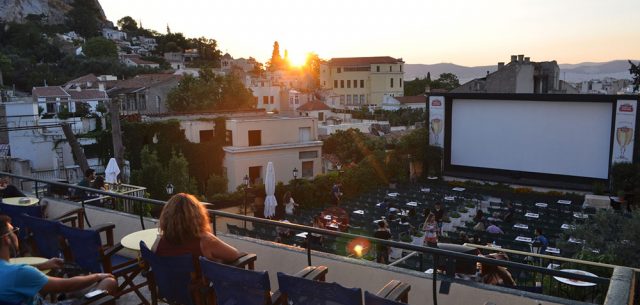Our Tragedy. How could this happen?

There is one question more than any other swirling around in our minds as we contemplate the devastation of last week’s train crash, which killed 57 people, mostly young Greeks: How could this happen? Macropolis’ Nick Malkoutzis analyses the collective failure of successive Greek governments.
How could this happen? It’s what my son asked me when he returned from school on Wednesday. It was the question being asked by students placing flowers at Thessaloniki train station, where their friends were due to arrive after celebrating the carnival weekend. It’s what parents who lost sons and daughters in the inferno caused by a passenger train travelling from Athens slamming into a freight train going in the opposite direction demanded to know. It’s what any reasonable person would wonder knowing these two trains had been moving towards each other for more than 10 minutes, without either driver having an inkling of impending danger.
There are always two parts to a tragedy: What happened and why it happened. On both counts, the train crash in Tempe, central Greece, was the grimmest possible – an avoidable, but predictable, loss of lives, many of which had barely begun. The more one peels away the layers of this incident to discover how such a collision could take place in 2023, when it’s possible for anyone with a smartphone to track the tiniest movement of everything from a pizza to a private jet, the more sickening the answers.
Railway safety has been a longstanding issue in Greece. An investigation by the non-profit Mediterranean Institute for Investigative Reporting (MIIR) published in 2019 indicated that Greece ranked first in the EU with regards to the number of deaths from rail accidents in proportion to the kilometres travelled by trains. Between 2010 to 2018, there were 137 deaths and 97 serious injuries in railway incidents in Greece.
This can be attributed to several factors, such as the mismanagement of public organisations that was symptomatic of the political short-termism which propelled Greece to its debt crisis in 2009. State entities, like the railway company TRAINOSE, were seen as a tool to serve the ends of political parties, not citizens, whether this was by running huge advertising budgets to help finance government-friendly media or by hiring unnecessary or unqualified personnel to win votes or pacify unionists. In the meantime, little attention was paid to investment in the service, leaving Greece with one of the most meagre railway networks in Europe at around 2,200 kilometres, as well as one of the most dangerous.
 The onset of Greece’s economic crisis doused any hopes of the service being upgraded. Successive Greek governments embarked on huge fiscal adjustment programmes to reign in huge deficits, repay the bailout loans provided by the EU and International Monetary Fund and restore the country’s public finances. The transport network, along with other public services, like healthcare, atrophied as they were forced to operate on shrinking budgets, with personnel shortages and by relying on makeshift fixes devised by increasingly despondent staff.
The onset of Greece’s economic crisis doused any hopes of the service being upgraded. Successive Greek governments embarked on huge fiscal adjustment programmes to reign in huge deficits, repay the bailout loans provided by the EU and International Monetary Fund and restore the country’s public finances. The transport network, along with other public services, like healthcare, atrophied as they were forced to operate on shrinking budgets, with personnel shortages and by relying on makeshift fixes devised by increasingly despondent staff.
In 2017, TRAINOSE was privatised. The government, then led by the left-wing SYRIZA party, sold the company for 45 million euros to Italy’s state railway firm Ferrovie dello Stato. The transaction was a commitment under the privatisation programme Greece had agreed with the troika, part of the terms of country’s three bailouts.
SYRIZA had been opposed to the privatisations when in opposition but, like those who governed before, it found itself with little choice but to keep to the formula agreed with the troika to hit fiscal targets and, in theory, make the Greek economy more competitive. The leftists had made their position, and that of Greece, worse by engaging in haphazard, costly and ultimately futile confrontation with the lenders in 2015, before holding a hasty and questionable referendum that summer.
The privatisation of what is now known as Hellenic Train created the kind of awkward jumble that other European countries have wrestled with: Railway operations in the hands of a private company, while infrastructure and maintenance of the rail network are the responsibility of others. In Greece’s case the latter tasks are handled by two state companies, OSE and ERGOSE respectively.
In this environment, where responsibility can be easily shifted from one entity to another, it seems little was done to address train safety. The lack of appropriate telecommunications and signalling equipment and an automatic protection system connected to the European Train Control System (ETCS) were highlighted repeatedly over the past few years by independent media and unions. There appear to be many reasons for this failure, including political inertia, bureaucratic delays, competing interests and a mishmash of competencies and public tenders. Ultimately, though, the dereliction of such a basic duty reeks of indifference.
An official overseeing the installation of the ETCS system on behalf of ERGOSE resigned last year because of concerns about the way the project was being executed. Less than a month before this week’s collision, the Panhellenic Union of Train Personnel (DESK) issued a statement warning that a deadly crash was imminent. According to railway staff, train drivers communicate with station masters at each station they pass through to know if it is safe to proceed along the track. On Friday, Naftemporiki newspaper reported that telecommand and signalling is not installed or not operational on 55 pct of Greece’s railway network. The same report suggests that OSE employs just 30 employees to maintain the network’s signalling, compared to a 300-strong staff in the past.

PM Mitsotakis visiting the site of the fatal train crash in Tempe
As part of his pre-election engagements around the country, Prime Minister Kyriakos Mitsotakis was due to visit the railway telecommand and signalling centre for northern Greece on Wednesday, just hours after the crash took place. His trip was cancelled and instead he travelled to Tempe, where he promised to investigate the causes of the crash and ensure nothing like this happens again.
A few hours later, the PM, and leader of the governing centre-right New Democracy party, made a televised address to confirm the resignation of the transport minister and two railway officials, but said that the accident was mainly due to human error. The blame is being placed on the station master at Larissa, the last station the intercity passenger train passed through before colliding head-on with the freight train.
One might ask why Mitsotakis would pre-judge the outcome of the cross-party investigation he announced in the same speech. Perhaps the fact that national elections are coming up in the next few weeks means it is politically expedient to provide a simple answer to the terrible question hanging over us. However, it is clear to anyone who doesn’t want a neat, guilt-free explanation that the failings which caused this crash go much deeper than whether the station master turned a key so the two trains would not be on the same track. He had reportedly only taken up the position recently after a few weeks’ training, perhaps an indication of the impact that cost-cutting and staff shortages have had. In any case, such heavy responsibility cannot rest in the hands of one employee. And, after all, this is why safety systems are necessary and deployed on railway networks around the world.
Collective failure
The Tempe crash is the distillation of how Greece has failed its current generation of young people. Many of those who died just before midnight on Tuesday were just children when Greece signed its first troika bailout in 2010. They didn’t have a chance to enjoy the stability and prosperity of the previous three decades, when Greeks profited from membership of the European Union and single currency. Instead, they grew up in a country that was blighted by the wastefulness and myopia that this affluence brought, delivering a shrinking economy, mass unemployment, low wages and scant opportunities.
The lack of investment in infrastructure and public services, the unwillingness to reform public organisations and adopt best practices in the state and private sectors left this generation growing up in a country driven not by a vision for a better, more sustainable future but by a need to tick tasks off a list to get its next loan installment from the troika. In this turmoil, young people’s happiness, growth and security became side issues. The passing of the crisis may have ushered in a new period of economic growth but the initial evidence around this week’s train crash suggest the foundations on which Greece is building again continue to be withered.
Faced with the tragic events in Tempe, Greek politicians are calling for inquiries and responsibility to be apportioned, when it is clear where accountability lies. Greece has been governed by parties from almost every part of the political spectrum over the last couple of decades, from the ultranationalist right, to the radical left and the liberal centre in between. The apathy and self-interest that lies behind this disaster was in evidence on all their watches. As is usually the case in such circumstances, the immediate political liability weighs on the incumbent. New Democracy also championed rail privatisation, only admonishing SYRIZA over the low price it secured, and has claimed success in making the railways profitable. Any attempt to shirk this responsibility by making an individual, such as the station master, a sacrificial lamb will be a travesty. Equally, any attempt by the opposition to skirt over longstanding pathogenies will be pure opportunism.
Greek society also needs to examine its role in this tragedy. The safety issues had been highlighted, by independent media in particular, but these stories never became major talking points in the public debate. Much of the mainstream media is more interested titillating issues that can spark a rowdy, but vacuous, political discussion, which a large part of the public seems to willingly lap up. Our experience from recent years, when we paid a high price for ignoring real, pressing problems in favour of political theatre should have destroyed this doom loop. It seems, though, we are stuck on repeat.
If we really want to find out how this train crash happened, the answers are all there, scattered through our recent history, like the belongings of those unfortunate travellers in the front carriages of Intercity 62 from Athens to Thessaloniki on Tuesday night. The truth is that we failed them. We had many chances to do so much better. That’s how this happened. That’s our tragedy.
This article first appeared in Macropolis.
Nick Malkoutzis and a group of colleagues launched MacroPolis, a website providing political and economic analysis about Greece, in September 2013.
Since then, MacroPolis has built a strong reputation among diplomats, European officials, investors and businesses for providing valuable insight and data that makes sense of events.
MacroPolis has produced its own reports about the political-macro landscape in Greece, as well as undertaking bespoke research and analysis for private clients and public bodies, focussing on specific sectors of the Greek economy.Nick worked at Kathimerini English Edition, an English-language daily published in Greece in cooperation with the New York Times, between 2004 and 2018. He held the position of deputy editor for several years and later wrote a weekly column on economic developments. Nick was a regular contributor to Athens Insider from 2008 to 2015.
Between 2008 and 2010 he was also the editor of Athens Plus, which was named best-designed weekly newspaper at the European Newspaper Awards.
Nick has written for Bloomberg Businessweek, Foreign Policy, Newsweek, The Guardian and Die Zeit. He has commented on events in Greece for a range of international media, including BBC News, Al Jazeera, Bloomberg TV and NPR. He has also written several policy papers about Greece for the Friedrich Ebert Foundation in Germany.You can follow Nick on Twitter at http://twitter.com/NickMalkoutzis













